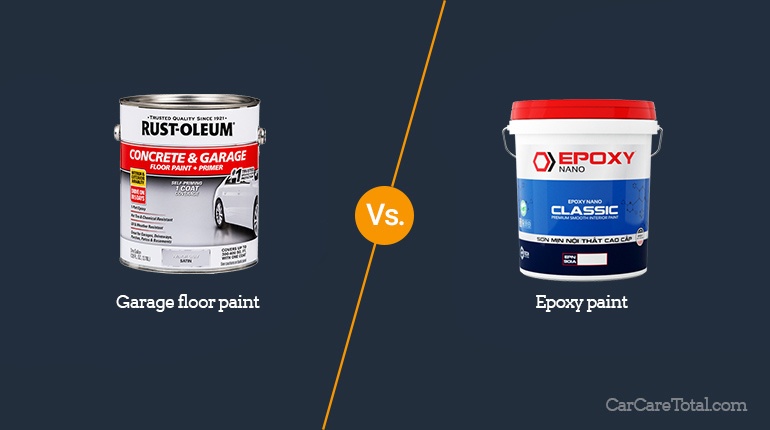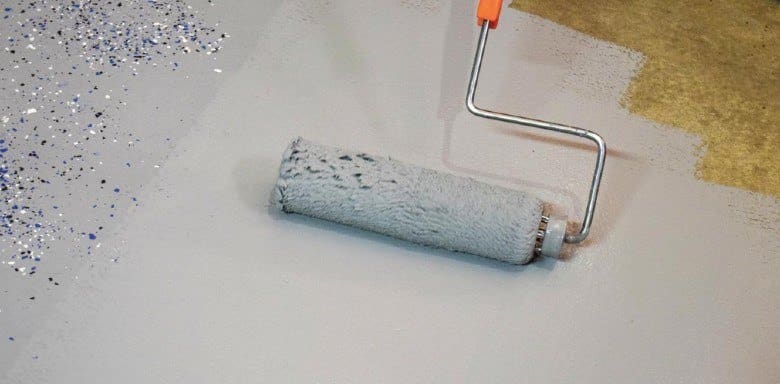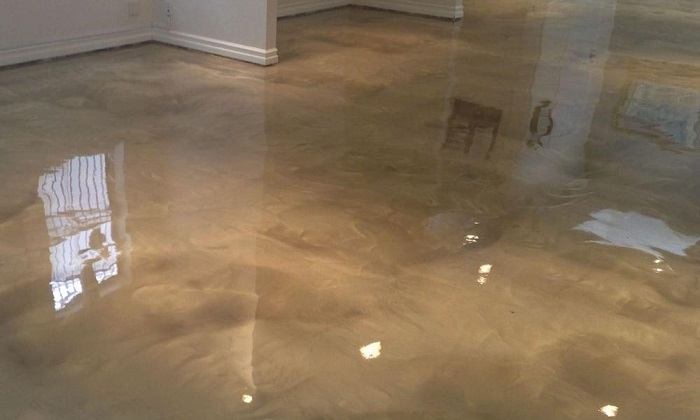by Joshua Thomas
When you have to paint your garage floor, whether you are doing it for aesthetic purposes or to boost your home's value, you will typically end up having to choose between garage floor paint and epoxy.
Both do a good enough job covering and protecting your garage, but despite the obvious confusion, they are not the same thing and will hence be ideal for different situations.
Also, there are various variations and options for both categories, but understanding what they are all about and their differences should help make the choice an easier one for you. Here we provide brief overviews of each and also explain the few things that set them apart.
Contents


Garage floor paint is a specially formulated paint meant to adhere to concrete floors, which is typically what you will get in most garage floors. This paint is quite similar to regular wall paint, but it is tougher given the areas it is meant to cover.
You can get garage floor paint in oil-based and latex versions that deliver different kinds of finishes, and hence making them ideal for different kinds of users. But, both paints can be easily applied with a roller or paintbrush.
What many users seem to love most about the garage floor paint is that besides being quick and easy to apply, it will also not require a lot of preparation, and hence saving you even more time.
Floor paint will also be very effective at covering most of the stains and irregularities on the floor, which leaves a more pleasant finish. And like regular wall paint, you can also get it in a wide variety of texture and color choices to suit many tastes and preferences.
However, when compared to epoxy, the garage floor paint will not be very durable, and you might need to reapply them more frequently. Also, this means that they will not work very well for high traffic areas as they will wear out fast.
Pros:
Cons:

Although it is often also referred to as a floor paint type, epoxy is a floor coating that will consist of epoxy resin and a hardener, and it will provide a tougher and more durable surface than paint.
Also, the nature of epoxy makes it more resistant to abrasion, staining, and chemicals, and will hence be perfect for anyone looking for a long term garage floor protection solution.
Like floor paint, epoxy will also allow you to give the floor your preferred color. However, the epoxy goes on as a clear coating and to get a different color, you will need to tint the resin, unlike paint which comes in various color options.
Besides being tough, many people will also find the epoxy coating more aesthetically appealing, and it will give the garage floor a more upscale look, and this is more so when it is properly applied and allowed to cure well.
The toughness of epoxy means that it will be better equipped to handle high traffic areas with minimum wear. Hence, if your garage tends to be very busy or you want something to cover the floor on a commercial garage, then epoxy is your best bet.
However, all these fantastic traits come at a cost as epoxy tends to be more expensive than garage floor paint. Also, its application will come with more work and takes more time given the tedious and thorough preparation required.
Pros:
Cons:
| Garage Floor Paint | Epoxy | |
|---|---|---|
| What Is It? | Regular latex or oil-based paint | Floor coating with epoxy resin and polymer hardener |
| How to Apply | Clean garage floor, repair cracks, etch where necessary and then apply paint | Prepare and clean the surface, prime and fill the floor and apply two coats of epoxy with a roller |
| Lifespan | Around 2 years | 3 to 5 years |
| Cost | $ | $$ |
There is no doubt that both garage floor paint and epoxy will be very effective at protecting the garage floor from the element and also from the abuse that comes with its typical uses. But, because the two are not the same, you need to keep the following differences in mind to ensure that whatever you choose will be ideal for your particular situation.
One of the best ways to tell these two apart is by understanding what each is all about. For anyone that has enough experience with different kinds of coatings and paints, it should be easy to tell these two apart just by looking at them, but this is not always the case for everyone.
Garage Floor Paint
Starting with garage floor paint, it will be more like the regular paint used on walls, but given that it is meant for the floor, it will be relatively tougher to ensure it can take more abuse.
The texture of the paint is also specifically designed for a floor where grip is more important than a slick finish.
And you can get the garage floor paint in latex and oil-based versions. The latex paints will be water-based, which makes them super easy to clean, and will leave a flat finish when dry.
Oil-based paint will have a nice, glossy finish when dry, and cleaning them takes more effort as a special cleanup solvent is required. However, these paints are more durable.
Garage Floor Epoxy
Epoxy will feature a two-part formulation, and it is meant to be more of a coating than a paint. A typical garage floor epoxy will contain equal parts of epoxy resin and polyamine hardener, and you will have to mix the two before application.
For colored epoxy, the resin will have to be tinted in the color that you prefer. Otherwise, epoxy will always cure as a clear coating.
When trying to decide whether to go for the floor paint or epoxy, you also need to consider which one will give you the easiest time, or even which you think you can hack without having to call in professional help. Luckily, both are fairly easy to apply, and below we provide a breakdown of the steps involved.
Garage Floor Paint
Like regular wall paint, garage floor paint can be applied with both roller and brush or even sprayed on. But, what makes the application super easy is that there is little and simple preparation required.
Things You Need
Directions
Step 1: Clean the Floor
The first step when painting the garage floor should always be to give it a thorough cleanup to get rid of any surface debris and dirt as they can affect the paint's adherence to the surface.
At this step, a degreaser will be very useful as the chances are there are oil and gas spills all over the garage. Also, make sure you use a stiff brush to give the floor a thorough scrubbing, and if you have a pressure washer, the better as it is very useful when dealing with heavy stains.
Step 2: Etch the Floor
While this step is optional, it is important to note that etching the floor or giving it an acid bath will help ensure the paint adheres well thanks to the rougher texture.
For etching, you will need an etching product or something like muriatic acid, and you only need to follow the manufacturer's direction to determine how to apply it. And after etching, remember to give the surface a thorough rinse to remove any chemical residue.
Also, it is possible to give the floor a rough texture using a sander or power grinder if you prefer not to use chemicals on your garage floor.
Step 3: Apply First Paint Coat
Once the floor is clean and dry now, you can apply the first coat of paint. Many paint experts will often advise that you thin out the paint a little for the first coat to ensure it is properly absorbed by the concrete floor.
And here a paintbrush does a better job working the paint onto the floor than a roller. You should then allow the first coat to dry.
Step 4: Apply Second Paint Coat
Depending on the paint type you are using, it will take anywhere from a few minutes to a few hours for the first coat to dry. But, once dry enough, you can apply the second coat.
This second coat is often thicker, and you can use either a roller or brush as both work fine here. In some cases, a third coat will be necessary, but in many instances, two coats are just fine.
The last thing that you need to do is to give the paint enough time to dry, and also ensure the garage has proper ventilation for faster drying.
Garage Floor Epoxy
Although floor epoxy requires some extra preparation work, it is still quite easy to apply, and with a few hours to spare over the weekend, you should be able to do it.
Things You Need
Step 1: Prepare and Clean Surface
Like when painting the garage floor, the first step when applying epoxy will be to prepare and clean the surface to ensure it adheres well.
Here you need to use the degreaser to remove any surface oil on the floor, and also sand off any residue before giving the floor a thorough cleanup and leaving it to dry.
As you are cleaning, it will also be a good idea to etch the floor with muriatic acid as this will also improve adherence.
Step 2: Prime and Fill Floor
Some people choose to skip priming, but it is still important as it ensures durability. Also, priming seals the substrate and ensures there is little risk of bubbles and gasses and can reduce the amount of product you end up using.
At this step, you should also fill up any holes and crack in the floor to ensure that it will have a flawless finish once the epoxy is applied.
Step 3: Mix the Epoxy
The next step is to mix the epoxy as in most instances it will come in two parts, which are the resin and hardener. Here you only need to follow the manufacturer direction to ensure you get the proportions and mixing process right.
Step 4: Apply First Epoxy Coat
Once the epoxy is well mixed, you can now apply the first coat. A roller does the best job when it comes to epoxy application.
For the best results, you should start from one corner of the garage and work your way to the exit, and try to keep the coat as thin and even as possible. Once you cover the entire floor, you should leave the coat to dry for around 12 to 24 hours.
Step 5: Apply Final Coat
The last step of the process is to apply the second coat. Here the process is similar to the first coat, but you will first need to inspect the surface to make sure the first coat went in well. After the application, you will also need to give the epoxy another 24 hours to dry.
The lifespan for both garage floor paint and epoxy is largely dependent on the quality of the particular product that you use and also how well you apply it.
With that said, epoxy tends to be more durable than the paint given that it has resin and a hardener. And if you get an epoxy with a high percentage of solids, it will be a long time before you need to redo it.
Overall, most garage floor paint will need redoing after around 2 years while a typical epoxy coating can last anywhere between 3 and 5 years.
Cost is another key difference between floor paint and epoxy that you will need to keep in mind when deciding which option to go with.
Despite the differences in product prices from different brands for both options, it should be obvious that epoxy is the more expensive of the two given the superior quality.
On average, epoxy will cost around double what you would spend on garage floor paint. The cost per square foot for garage paint is around under $0.5 to $1 per square foot while for epoxy it can be upwards of $3 per square foot.
However, these numbers are subject to various factors such as the job size and conditions, brand and where you are buying the materials from and will hence vary significantly
Garage floor paint and epoxy provide a fantastic way to protect your garage floor, which besides giving you a conducive place to store your vehicle and for your projects, also helps to boost the value of your house.
Unless you have already tried out both. Choosing one option over the other is not always easy. However, by keeping the few differences between the two above in mind and also understanding their pros and cons, things should be less confusing.
All in all, the garage floor paint is a good option when you want something inexpensive that is quick and easy to apply and will not mind having to redo it a little more frequently. Epoxy, on the other hand, is perfect when you want something that offers long-lasting service and can work for high traffic areas.
Sources
 |
 |
 |
 |

About Joshua Thomas
Joshua Thomas just simply loves cars and willing to work on them whenever there's chance... sometimes for free.
He started CarCareTotal back in 2017 from the advices of total strangers who witnessed his amazing skills in car repairs here and there.
His goal with this creation is to help car owners better learn how to maintain and repair their cars; as such, the site would cover alot of areas: troubleshooting, product recommendations, tips & tricks.
Joshua received Bachelor of Science in Mechanical Engineering at San Diego State University.
Just Car Care